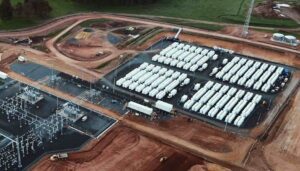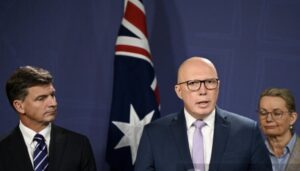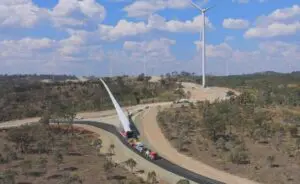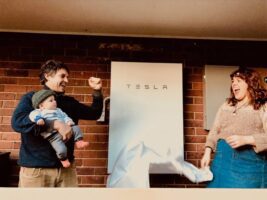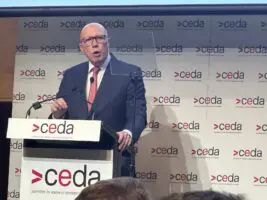Environment Minister Greg Hunt on Sunday became the latest in a conga line of federal government ministers – from the Prime Minister down – to make an appearance on the Ten Network’s The Bolt Report. And, like his predecessors, Hunt was keen to make an early offering suitable for the court of Australia’s most influential far right commentator:
“The extreme left …. is against electricity,” Hunt offered, to Bolt’s great pleasure, as he dived to the bottom of the barrel to drag out one of the favourite memes that can be found in the darkest recesses of blogs such as Bolt’s.
This holds that the “Left” wants to wear hair shirts, live in caves, and are anti capitalist. And, of course, they don’t want electricity. And, by the “extreme left”, Hunt means organisations such as GetUp, the Greens, environmental groups and anyone else who is against the development of the massive thermal coal mines in Queensland and elsewhere.
Actually, in the context of the Carmichael coal mine, which was the subject of the “discussion” between Bolt and Hunt, it is that most people – at least those beyond the coal lobby – simply think that there are smarter, cleaner and less damaging ways of doing business.
But Hunt wasn’t ready to stop there.
“At the end of the day, this is about providing electricity to up to 100 million people in India. Obviously, there’s an enormous benefit for Australian families and communities. But, in India, where 100 million people can be lifted out of poverty, where there can be electricity for hospitals and schools, of course the hard left, the extreme left, are silent about that, they effectively demonise the people that are bringing folk out of poverty, and I think it’s time that they have an honest conversation.”
This line of attack, that anyone opposed to a coal mine must be opposed to electrification for rural poor, is borrowed straight from the hymn sheets of the major coal lobbies in Australia, and in the US.
“If you listen to the extreme left, the people who have always argued for electricity to reduce poverty, now, they’re against the electricity,” Hunt continued.
Except, that’s just not the case. When the new Indian Prime Minister Narendra Modi was elected to power recently, he vowed to bring electricity to the 300 million plus people in India who don’t have power by 2020.
And he promised to do this not with coal, but with solar. Why? Because it’s the only way he thinks it is possible. India is looking beyond the high costs of coal-fired generation and the old centralized model, and the massive investment in grid infrastructure that that entails, to new technologies that offer cheaper and simpler alternatives, such as solar and distributed generation.
As Tim Buckley, from the Institute of Energy Economics and Financial Analysis, explains, delivering coal power to the rural poor would require them to pay prices they simply couldn’t afford.
Adani, the developers of the Carmichael deposit, need a wholesale power price of around Rs5-6/kWh to break even in Australia before funding and then make money in the downstream Indian power generation. This is double the current wholesale power price in India of Rs3/kWh.
But Adani also needs to also make a return on his proposed $10 billion investment in Australia. To do that, it needs an energy adjusted thermal coal price of US$100/t fob (free on board). The current price is around $US70/tonne.
At a price of US$100/t Adani would need an electricity price of over Rs7/kWh back in India. But in India, a solar plant to deliver power in can be built for Rs5.50/kWh today – with zero inflation or currency risk for the next 25 years.
Or Adani could build wind or hydro at Rs4.60/kWh or US$75/MWh. “Why would Adani bother with imported coal?” Buckley asks. “No nationalistic agenda is appeased by locking in imported inflation at such a high cost.”
And no Australian agenda is appeased by waving through approvals of such “carbon bombs”, with such massive implications for environmental wonders such as the Great Barrier Reef, and then seeking to justify them with such ridiculous attacks on those that oppose them. No agenda, that is, apart from that of the far right – led by Bolt – that this government is only too willing to appease.




